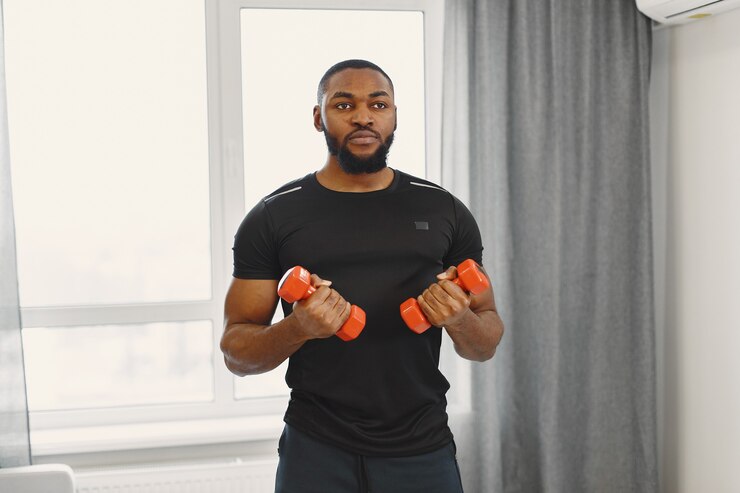In a world filled with constant demands and distractions, it’s easy to overlook our most valuable asset: our health. Yet, staying fit isn’t just about looking good; it’s about feeling better, living longer, and unlocking our full potential. In this blog post, we’ll explore the transformative journey to becoming our best selves through the pillars of physical fitness, mental well-being, and emotional balance. Get ready to embark on a journey of self-discovery and empowerment as we delve into the practices and principles that will guide you towards a healthier, happier, and more fulfilled life.

The Importance of Holistic Fitness:
Before we dive into the specifics of staying fit and feeling better, let’s first understand what it means to embrace a holistic approach to fitness. Holistic fitness goes beyond simply focusing on physical exercise or dietary habits; it encompasses all aspects of our well-being, including mental and emotional health. By nurturing our minds, bodies, and spirits, we can achieve a state of harmony and balance that allows us to thrive in every area of our lives.
Physical Fitness: Strengthening the Body:
Physical fitness forms the foundation of our overall well-being. Regular exercise not only improves our physical health but also has a profound impact on our mental and emotional states. Whether it’s through cardiovascular activities like running or cycling, strength training exercises, or flexibility-enhancing practices like yoga, finding ways to move our bodies regularly is essential for staying fit and feeling better.
- Cardiovascular Exercise: Cardiovascular exercise, such as running, swimming, or cycling, gets our heart pumping and improves our endurance. Aim for at least 150 minutes of moderate-intensity aerobic activity or 75 minutes of vigorous-intensity activity per week to reap the benefits of cardiovascular exercise.
- Strength Training: Strength training exercises, such as lifting weights or using resistance bands, help build muscle mass, increase bone density, and improve overall strength and stability. Incorporate strength training into your routine at least two days per week, focusing on major muscle groups like the legs, chest, back, arms, and core.
- Flexibility and Mobility: Flexibility and mobility are often overlooked aspects of physical fitness, yet they are crucial for preventing injuries, improving posture, and enhancing range of motion. Incorporate stretching exercises, yoga, or Pilates into your routine to maintain flexibility and mobility in your muscles and joints.
Nutrition: Fueling the Body:
In addition to regular exercise, proper nutrition plays a vital role in staying fit and feeling better. The foods we eat provide the fuel our bodies need to function optimally, so it’s essential to nourish ourselves with a balanced diet rich in whole foods, fruits, vegetables, lean proteins, and healthy fats.
- Whole Foods: Focus on incorporating whole, unprocessed foods into your diet, such as fruits, vegetables, whole grains, lean proteins, and healthy fats. These nutrient-dense foods provide essential vitamins, minerals, and antioxidants that support overall health and well-being.
- Balanced Macro nutrients: Pay attention to the macro nutrient composition of your meals, aiming for a balance of carbohydrates, proteins, and fats. Carbohydrates provide energy for physical activity, proteins support muscle growth and repair, and fats help regulate hormones and promote satiety.
- Hydration: Stay hydrated by drinking an adequate amount of water throughout the day. Aim for at least eight glasses of water per day, or more if you’re physically active or live in a hot climate. Proper hydration is essential for supporting digestion, regulating body temperature, and maintaining overall health.
- Mindful Eating: Practice mindful eating by paying attention to your hunger and fullness cues, savoring each bite, and avoiding distractions while eating. Mindful eating helps foster a healthier relationship with food and promotes better digestion and nutrient absorption.
Mental Well-being: Nurturing the Mind:
In addition to physical fitness and proper nutrition, mental well-being is a crucial component of overall health and happiness. Our mental health affects every aspect of our lives, from our relationships and work performance to our ability to cope with stress and adversity. By prioritizing mental wellness and adopting practices that promote psychological resilience and emotional balance, we can cultivate a greater sense of well-being and fulfillment.
- Stress Management: Chronic stress can take a toll on our physical and mental health, contributing to a range of health problems, including anxiety, depression, and cardiovascular disease. Practice stress management techniques such as deep breathing, meditation, mindfulness, or progressive muscle relaxation to reduce stress levels and promote relaxation and calm.
- Positive Thinking: Cultivate a positive mindset by focusing on gratitude, optimism, and self-compassion. Positive thinking has been linked to improved mental health, greater resilience, and enhanced overall well-being. Challenge negative thought patterns and reframe setbacks as opportunities for growth and learning.
- Mindfulness and Meditation: Incorporate mindfulness and meditation practices into your daily routine to quiet the mind, increase self-awareness, and cultivate a sense of inner peace and tranquility. Even just a few minutes of meditation or mindfulness each day can have profound effects on mental clarity, emotional balance, and overall happiness.
- Connection and Community: Build strong social connections and cultivate a supportive community of friends, family, or like-minded individuals. Social support is a powerful buffer against stress and adversity, providing comfort, encouragement, and a sense of belonging that contributes to overall well-being.
Emotional Balance: Cultivating Inner Peace:
In addition to physical fitness and mental well-being, emotional balance is essential for overall health and happiness. Emotions are a natural part of the human experience, but when left unchecked, they can disrupt our equilibrium and negatively impact our health and well-being. By learning to recognize, understand, and regulate our emotions, we can cultivate greater emotional intelligence and resilience, leading to a more fulfilling and meaningful life.
- Self-awareness: Cultivate self-awareness by paying attention to your thoughts, feelings, and behaviors without judgment. Self-awareness is the first step towards emotional intelligence, allowing us to identify our emotions, understand their underlying causes, and choose how to respond to them effectively.
- Emotional Regulation: Practice emotional regulation techniques to manage intense emotions and prevent them from overwhelming you. Techniques such as deep breathing, progressive muscle relaxation, or visualization can help calm the nervous system and restore a sense of equilibrium during times of stress or emotional distress.
- Authenticity and Vulnerability: Embrace authenticity and vulnerability by allowing yourself to express your true thoughts and feelings openly and honestly. Authenticity fosters deeper connections with others and promotes a greater sense of self-acceptance and self-worth.
- Resilience and Adaptability: Cultivate resilience and adaptability by embracing life’s inevitable ups and downs with grace and resilience. Recognize that setbacks and challenges are a natural part of the human experience and view them as opportunities for growth, learning, and personal development.
Conclusion:
By embracing a holistic approach to fitness that nurtures our physical, mental, and emotional well-being, we can unlock our full potential and live happier, healthier, and more fulfilling lives. From prioritizing regular exercise and proper nutrition to cultivating mindfulness and emotional resilience, each step we take towards self-improvement brings us closer to becoming the best version of ourselves. So, take the first step today and embark on the journey to unlocking your best self – your future.



It is good to cultivate positive mindset to regular exercise and good nutrition.
Good write up. Thanks for sharing.
Nice one
Good one
Thank you for your sharing. I am worried that I lack creative ideas. It is your article that makes me full of hope. Thank you. But, I have a question, can you help me?
Thank you for your sharing. I am worried that I lack creative ideas. It is your article that makes me full of hope. Thank you. But, I have a question, can you help me?